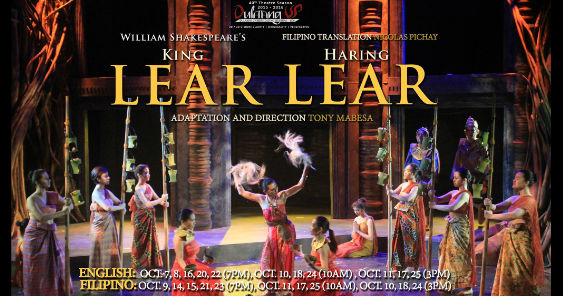by Jun Austria
A successful mounting of Shakespeare’s King Lear — a complex tragedy on aging, power, paternal love, trust, betrayal, and madness – requires a mastery of the classics, a depth of understanding of the theater arts, and an imaginative sensibility. These are precisely what Professor Emeritus Antonio Mabesa possesses and accomplishes in his adaptation and direction of the play for Dulaang U.P.’s 40th anniversary season.
The staging is clear, precise, and correct – vintage Mabesa, founding director of Dulaang U.P. and Professor Emeritus of Theater Arts at the University of the Philippines. Far from being antiseptic, his re-conceptualization of the drama is with grit and passion. As such, the audience both understands the complexity of the character’s physical and emotional circumstances and empathizes with the protagonist’s travails.
Mabesa’s adaptation of King Lear into Haring Lear is also a triumph in translation, design, and performance. The translation by Nicolas Pichay uses a Filipino that is seldom heard anymore. The language sings to the heart, evoking feelings for Haring Lear and his agony; and pierces the mind with arguments and counter-arguments on getting old, love of family, and the power-struggles of governing. The design — set by Ohm David, costume by Eric Pineda, lights by Meliton Roxas, Jr., sound by Jehtro Joaquin, props by Arnel Paguyo, and choreography by Jeremy dela Cruz – brings the audience to a mythical kingdom, reminiscent of Angkor Wat, the angels of Borobudur, the kulintangs of Mindanao… the colors of Southeast Asia. The acting approach is stylized, very theatrical (as opposed to cinematic realism). This style, suggestive old acting traditions, is not alienating and did not make caricatures out of the characters in the play. Instead it provided a visceral depth to the personas essayed in the tragedy. And this style was used consistently by all the performers, creating a cohesive and unified whole that added to the mythical world created by the director. Of note is the performance of Joel Lamangan: raw and passionate was his interpretation of the lucid, turned mad, then lucid, then mad… Haring Lear.
Mabesa’s treatment of King Lear stayed true to the text of Shakespeare. But he brought this ancient text into contemporary light. In the end, he provokes us into thinking about how we treat the elderly in our present society wherein the Confucian ethics of filial piety is constantly challenged by being part of the global village. He also asks us to consider loyalty and good governance in today’s political disorder and dysfunction, specially during this season of elections.









